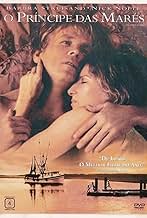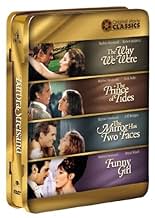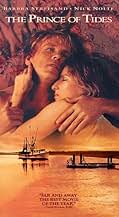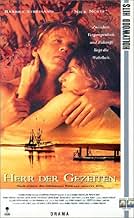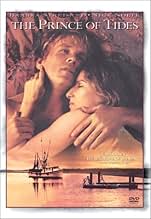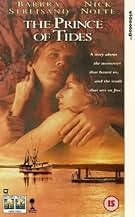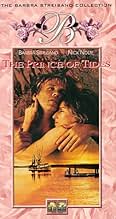Ajouter une intrigue dans votre langueA troubled man talks to his suicidal sister's psychiatrist about their family history and falls in love with her in the process.A troubled man talks to his suicidal sister's psychiatrist about their family history and falls in love with her in the process.A troubled man talks to his suicidal sister's psychiatrist about their family history and falls in love with her in the process.
- Réalisation
- Scénario
- Casting principal
- Nommé pour 7 Oscars
- 3 victoires et 18 nominations au total
- Savannah Wingo (age 10)
- (as Nancy Atchison)
Avis à la une
There are so many scenes in The Prince of Tides that are moving and memorable, and they greatly outshine the less-than-stellar elements of the film. Nick Nolte plays a family man whose family life isn't particularly stable. He's spent a lifetime burying the secrets of the past, but when his sister, Melinda Dillon, tries to commit suicide, he travels from South Carolina to New York City and meets her therapist, Barbra Streisand. He and Barbra frequently clash, and while he is given very good lines to say, the way he says them is even better than they were written. He's quick to raise his voice, and when he does, it's clear he's releasing decades of pent-up emotion through his throat. Even when he's being a loving father to his three children, you can see the unresolved tension on his face.
You'd think it would be impossible to play against Nick's powerful performance and not give a very good one, but Blythe Danner proves my supposition wrong. She looks very pretty and has an absolutely adorable hairdo, but her acting leaves much to be desired. Then again, when you're watching Nick Nolte-who lost the gold to Anthony Hopkins for sixteen minutes of The Silence of the Lambs-you don't really care about Blythe Danner. Kate Nelligan, who plays Nick's mother, does do a very good job, so if you're a fan, you might want to see her only Oscar-nominated performance.
Normally, I don't really like movies that flash back and forth between the present and the past, but it's only because most directors don't handle the transitions very well. Ms. Streisand masters the difficult task, and every time the film flashes back to Nick's childhood, it's in an inventive, intriguing style. The "dual timeline" narrative is extremely popular nowadays, so if you like that style, you'll be in a great position to appreciate this marvelously crafted film. Before you rent it, though, just know that it's very heavy. You'll probably need to bring your Kleenexes, and you'll feel unsettled more than once. You might not want to watch this with your parents, and you should definitely put the kids to bed before movie night starts. It's extremely heavy.
My one problem with the film is the upsetting scenes involving child actors. I've always maintained that Hollywood should pass a "child labor law" where if a child is under the age of fifteen, they cannot be employed; instead, a computer-generator child actor should be used. I could go on for hours about the damage acting does to children, but I'll refrain. In 1991, computer technology wasn't very advanced, but I still feel the child actors should have been used as infrequently as possible. I recently read Ms. Streisand's memoir, and she insisted the section I'm referring to be included in the final screenplay. There were versions that wouldn't have used the children as much, and I firmly believe the movie would have been as effective if the section were revealed in dialogue with Nick instead of a visual flashback with the child actors. I'm sure there are audience members who disagree, but I just can't watch this movie (I've only seen it once) because I think of the emotional repercussions of the children. Besides that, Ms. Streisand's directing is flawless, and during the Hot Toasty Rag Awards, the board members proudly and unanimously awarded her Best Director.
Kiddy warning: Obviously, you have control over your own children. However, due to upsetting situations involving children and adult material, I wouldn't let my kids watch this movie. Also, there may or may not be a rape scene.
Streisand graciously hands the spotlight over to actor Nick Nolte, who gives the most sensitive, emotionally complex performance of his varied career. Tom Wingo is a walking shell of a man who quells his pain with a drink, an easy smile, a cleverly foul remark, and a bitter, uncontrollable outpouring of anger. A one-time Southern-bred football coach-turned-teacher, he has grown increasingly irresponsible and disconnected over the years. With a troubled marriage hovering over him, he conveniently heads off to New York City at the urging of sister Savannah's psychiatrist, Susan Lowenstein, following his twin's most recent wrist-slashing attempt. His purpose is to fill in the missing details of her tormented past (she has blotted out all childhood memories) in order to help steer the psychiatrist in her recovery process. Eventually, Tom, who lacks faith in psychiatry, finds himself facing his own demons as these initial discussions about Savannah take a suddenly dramatic and romantic turn.
In addition to Nolte's Oscar-nominated showcase, much of the film's strength lies in the highly concentrated flashback sequences as Tom recalls his turbulent family life. Kate Nelligan (also Oscar-nominated) is simply extraordinary as Lila, Tom's brittle, often callous mother, who quite understandably vows to remarry into money after surviving a horrific first marriage to Tom's violent, alcoholic, dirt-poor father (played by an absolutely terrifying Brad Sullivan). Nelligan grabs this role literally by the throat and allows her character no apologies for her flawed, self-serving logic, despite the effects it would have on her children, as her wealthy second husband starts exhibiting the same abusive traits as the first. Kudos must also go to the three strong young actors who play the Wingo siblings as children for reenacting the more horrific elements of this story.
Some of the other present-day roles, however, are hit-and-miss in their effectiveness. Blythe Danner has some strained though affecting moments as Tom's neglected wife. Sadly, the vital role of Savannah is nearly excised from the film. What with the talented Melinda Dillon egregiously reduced to such an insignificant extra, one can only rue the dramatic potential untapped here. As Savannah's neighbor and trusted friend, George Carlin seems to be around merely to show off New York gay chic -- providing mild amusement, a bit of pathos, and little else. On a brighter note, Jason Gould (Barbra's real-life son) acquits himself surprisingly well in the difficult role of Lowenstein's antagonistic son who slowly bonds with Tom's absentee father figure -- showing for once that nepotism isn't necessarily blind or reckless. Dutch actor Jeroen Krabbé gets brief but noticeable exposure as Herbert Woodruff, Lowenstein's charming, smug-elegant husband, a renown concert violinist who demonstrates more affection for his Stradivarius than either his wife or child. There is one telling dinner scene at his opulent Manhattan high-rise in which the out-classed Wingo gets to put Woodruff in his place.
As for Streisand herself, many will invariably take her to task for casting herself in the fundamental role of Susan Lowenstein. A star of such magnitude always faces the daunting task of presenting a fully- realized character, and Streisand is only marginally successful here. Although there is undeniable sexual chemistry between her and Nolte, it's hard to overlook her somewhat glossy approach to the role and the unethical intentions of her character. One can only imagine the ramifications of such a harmful act had her suicidal patient ever uncovered the illicit affair between her brother and psychiatrist.
Director Streisand, however, must be applauded for her explicit attention to exterior details. A visually resplendent picture, great care was taken to get the right look and feel. Notice particularly the lovely allegorical scenes with the children at the beginning and end. And with Streisand's exceptional musicianship, it is hardly surprising that James Newton Howard's lush score is one of the most beautifully designed ever (in fact, I borrowed it for my own commitment ceremony in 1996). It floods the film with an unexpressible tenderness. Nick Nolte's bookend narration is perfect as well -- warm, wise, poetic and reflective.
And so, despite the flaws "The Prince of Tides" may have, Streisand certainly shows that her heart was in the right place.
Le saviez-vous
- AnecdotesWhen NBC broadcast the movie in 1995, Barbra Streisand called the network mid-movie to request they lower the volume on the commercials, which were loud compared to the relatively quiet movie. The weekend operations manager obliged, reducing them 2 decibels.
- GaffesSally's Southern accent appears and disappears as the film progresses.
- Citations
Herbert Woodruff: That Stradivarius is worth over a million dollars!
Tom Wingo: Well, if I drop it, it won't be worth shit.
Susan Lowenstein: Don't do it, Tom.
Tom Wingo: Apologize to your wife, Herbert.
Herbert Woodruff: You're bluffing.
Tom Wingo: I may be, but its a powerful bluff, isn't it, asshole?
[Tom throws fiddle high in the air]
Herbert Woodruff: [screaming] I'm sorry, Susan!
[Tom catches fiddle]
Tom Wingo: Sincerity becomes you, Herbie. Now apologize to me for your unforgivable breach of etiquette at the dinner table tonight, you possum-bred cocksucker.
Herbert Woodruff: I'm very sorry, Tom.
- Versions alternativesLaserdisc version contains an alternate end credits sequence with Barbra Streisand's vocal performance of "Places That Belong To You" (which was replaced in the final film by new end title music by James Newton Howard after Streisand felt that to include the song would bring back the Dr. Lowenstein character and destroy the focal point of the story, which would be the Tom Wingo character). Also, alternate versions of the Tom and Susan affair scenes, and the following deleted scenes (presented in a separate supplementary section at the end of the film):
- Tom remembering his late brother Luke;
- Tom visiting Savannah in the hospital early in the film;
- Tom confronting his father Henry;
- Tom sending flowers to Dr. Lowenstein;
- Lila being ridiculed as "white trash";
- and a love affair montage.
Meilleurs choix
Détails
Box-office
- Budget
- 30 000 000 $US (estimé)
- Montant brut aux États-Unis et au Canada
- 74 787 599 $US
- Week-end de sortie aux États-Unis et au Canada
- 10 035 412 $US
- 29 déc. 1991
- Montant brut mondial
- 74 787 599 $US
- Durée2 heures 12 minutes
- Couleur
- Mixage
- Rapport de forme
- 1.85 : 1
Contribuer à cette page




